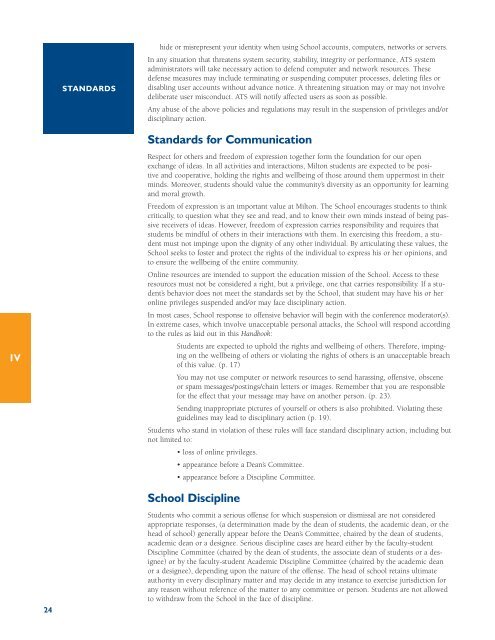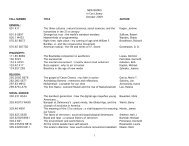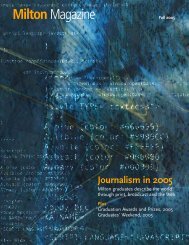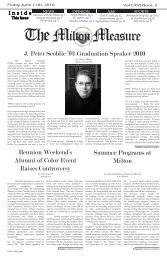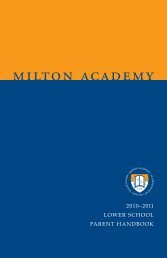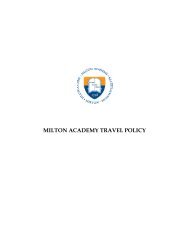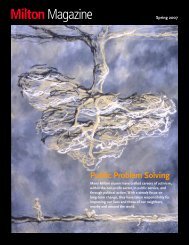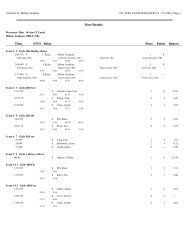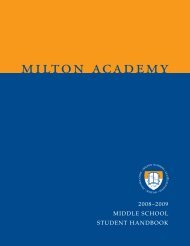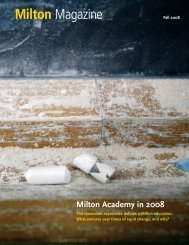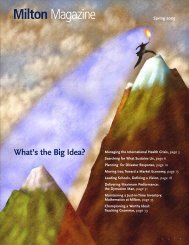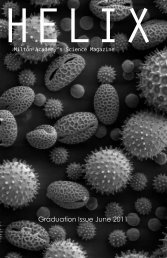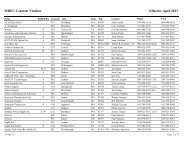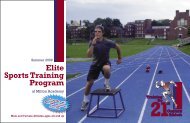Upper School Student Handbook 2013–2014 - Milton Academy
Upper School Student Handbook 2013–2014 - Milton Academy
Upper School Student Handbook 2013–2014 - Milton Academy
Create successful ePaper yourself
Turn your PDF publications into a flip-book with our unique Google optimized e-Paper software.
standards<br />
hide or misrepresent your identity when using <strong>School</strong> accounts, computers, networks or servers.<br />
In any situation that threatens system security, stability, integrity or performance, ATS system<br />
administrators will take necessary action to defend computer and network resources. These<br />
defense measures may include terminating or suspending computer processes, deleting files or<br />
disabling user accounts without advance notice. A threatening situation may or may not involve<br />
deliberate user misconduct. ATS will notify affected users as soon as possible.<br />
Any abuse of the above policies and regulations may result in the suspension of privileges and/or<br />
disciplinary action.<br />
IV<br />
Standards for Communication<br />
Respect for others and freedom of expression together form the foundation for our open<br />
exchange of ideas. In all activities and interactions, <strong>Milton</strong> students are expected to be positive<br />
and cooperative, holding the rights and wellbeing of those around them uppermost in their<br />
minds. Moreover, students should value the community’s diversity as an opportunity for learning<br />
and moral growth.<br />
Freedom of expression is an important value at <strong>Milton</strong>. The <strong>School</strong> encourages students to think<br />
critically, to question what they see and read, and to know their own minds instead of being passive<br />
receivers of ideas. However, freedom of expression carries responsibility and requires that<br />
students be mindful of others in their interactions with them. In exercising this freedom, a student<br />
must not impinge upon the dignity of any other individual. By articulating these values, the<br />
<strong>School</strong> seeks to foster and protect the rights of the individual to express his or her opinions, and<br />
to ensure the wellbeing of the entire community.<br />
Online resources are intended to support the education mission of the <strong>School</strong>. Access to these<br />
resources must not be considered a right, but a privilege, one that carries responsibility. If a student’s<br />
behavior does not meet the standards set by the <strong>School</strong>, that student may have his or her<br />
online privileges suspended and/or may face disciplinary action.<br />
In most cases, <strong>School</strong> response to offensive behavior will begin with the conference moderator(s).<br />
In extreme cases, which involve unacceptable personal attacks, the <strong>School</strong> will respond according<br />
to the rules as laid out in this <strong>Handbook</strong>:<br />
<strong>Student</strong>s are expected to uphold the rights and wellbeing of others. Therefore, impinging<br />
on the wellbeing of others or violating the rights of others is an unacceptable breach<br />
of this value. (p. 17)<br />
You may not use computer or network resources to send harassing, offensive, obscene<br />
or spam messages/postings/chain letters or images. Remember that you are responsible<br />
for the effect that your message may have on another person. (p. 23).<br />
Sending inappropriate pictures of yourself or others is also prohibited. Violating these<br />
guidelines may lead to disciplinary action (p. 19).<br />
<strong>Student</strong>s who stand in violation of these rules will face standard disciplinary action, including but<br />
not limited to:<br />
• loss of online privileges.<br />
• appearance before a Dean’s Committee.<br />
• appearance before a Discipline Committee.<br />
24<br />
<strong>School</strong> Discipline<br />
<strong>Student</strong>s who commit a serious offense for which suspension or dismissal are not considered<br />
appropriate responses, (a determination made by the dean of students, the academic dean, or the<br />
head of school) generally appear before the Dean’s Committee, chaired by the dean of students,<br />
academic dean or a designee. Serious discipline cases are heard either by the faculty-student<br />
Discipline Committee (chaired by the dean of students, the associate dean of students or a designee)<br />
or by the faculty-student Academic Discipline Committee (chaired by the academic dean<br />
or a designee), depending upon the nature of the offense. The head of school retains ultimate<br />
authority in every disciplinary matter and may decide in any instance to exercise jurisdiction for<br />
any reason without reference of the matter to any committee or person. <strong>Student</strong>s are not allowed<br />
to withdraw from the <strong>School</strong> in the face of discipline.


